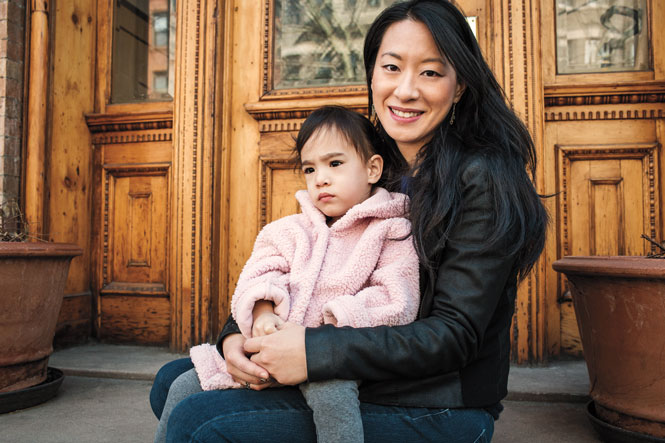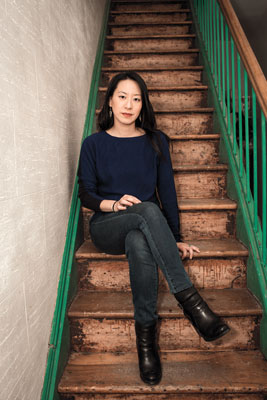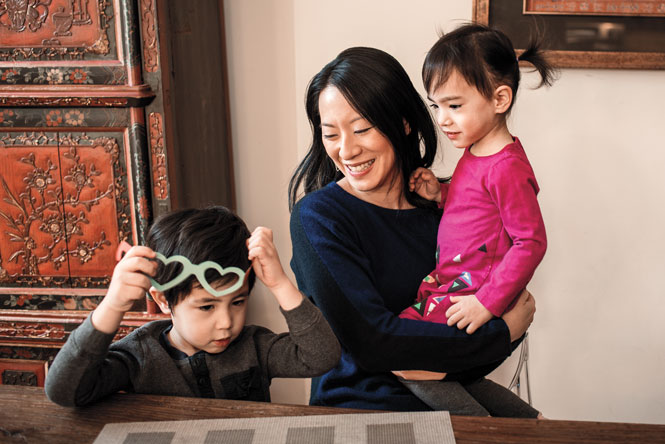By Naomi Shulman
A year ago AOL’s CEO blamed “distressed babies” for its benefits cuts. Deanna Fei ’99 is the mother of one of those children.
It started suddenly, as media firestorms do. Thursday morning, Feb. 6, 2014, AOL chief executive officer Tim Armstrong held a company-wide town hall to explain why he had made cuts to the retirement savings plan even though AOL had posted its best earnings in a decade. Armstrong said: “Two things happened in 2012. We had two AOL-ers that had distressed babies that were born that we paid a million dollars each to make sure those babies were okay. … So when we had the final decision about what benefits to cut because of increased health care costs … I made the decision to basically change the 401(k) plan.”

Deanna Fei ’99 and daughter, Mila
Boom. Thus began an Internet brouhaha. News sites picked up the quote, policy wonks dissected it, pundits analyzed its larger ramifications. For the next several days thousands of media outlets pumped out their own takes on the story—many with an ironic, detached stance, with “distressed babies” as a cruel punchline to a sick joke. The hashtag #distressedbabies floated across Twitter and Facebook. And then, as suddenly as it had started, the news cycle burned itself out. The spectacle died away as the collective Internet turned its attention to the next kerfuffle.
And Deanna Fei ’99, the mother of one of those so-called distressed babies, was left blinking in the dust, holding her perfectly content baby, trying to process what had just happened.
Fifteen months before, Fei, whose novel A Thread of Sky received multiple accolades in 2010, was focused on raising her son, Leo, then a year old, and was pregnant with her second child. On the evening of Oct. 8, 2012, all was quiet in her home in Prospect Heights, Brooklyn. Her husband, Peter Goodman, was packing to travel for his job as an editor at the Huffington Post, which is owned by AOL, and Fei was turning in for what she hoped would be a decent night’s sleep. But very early the next morning, she awoke to a sudden pain in her abdomen. It didn’t compute; Fei was only 25 weeks along, and her pregnancy had had no complications. “I could not understand what was happening,” she says. She took a handful of antacids and tried to go back to sleep. “It never occurred to me I could be in labor.”
But the pain was insistent and growing worse. Half an hour after she awoke, she was on the phone with her doctor. As soon as she managed to get a neighbor to stay with Leo, she was en route to the hospital. She got hold of Goodman just as he was boarding his plane. His taxi broke down on the way to the hospital, but he arrived just as she did—only to discover that she was fully dilated. “The official time of my admittance to the hospital was 7:40; Mila’s birth was 8:00 on the dot,” she recalls. “That’s how quickly it happened.” The events happened so precipitously, in fact, that Fei was having trouble keeping up. “I told myself, I’m having a miscarriage,” she says. “I had no idea about the edge of viability, or what it meant for a baby to arrive at 25 weeks. I just knew I was nowhere near the point where a baby is born.”
But this was not a miscarriage. It was a birth. Mila arrived via emergency C-section, a 1-pound, 9-ounce speck of baby whose size was offset by enormous, crushing statistical odds. “When I first saw her, all I could think was, She’s not supposed to be here,” Fei says. “I thought, She looks like she’s suffering. And I don’t know how to be her mother. I didn’t know how to be the mother of a baby who might not survive one hour, let alone a day, week, month. Having to deal with this level of uncertainty almost felt worse than if she just hadn’t made it.”
Mila was just barely alive—but she was alive, and perhaps inevitably, people began to refer to her as a miracle baby. They meant well, but Fei, a writer sensitive to every word choice, flinched at this one. “Here we were absorbing the shock and the terrifying odds she was facing, truly not knowing if she’d survive. But we were buffeted between these two extremes, the other being this talk of, ‘She’s a miracle child! She’s going to be a miracle!’” Fei tries to put her finger on why the term sat wrong with her. It almost reduced her daughter to an idea. “A miracle is an outcome you pray for. It’s not a person. I couldn’t fall in love with a mirage.”
But later, when Mila’s neonatologist burst into tears while telling Fei and Goodman that their daughter had suffered a brain hemorrhage, Fei heard the word she felt she actually needed to hear. The word was catastrophe. “She used that word—‘when you have a birth as catastrophic as this’—and she started to cry at that moment. Her choice of words cut through the talk of miracles and allowed me to acknowledge that this is my reality, my daughter’s reality. No talk of blessings and prayers and inspiration would take that away.”
In a sense, though, Mila’s time in the NICU was both miraculous and catastrophic. She was placed on a ventilator, received ultrasounds and transfusions, and had all manner of tubes inserted into her, including a central line that nearly reached her heart. But she clawed her way through the next three months in the hospital, doggedly defeating every set of odds before her, only to have them immediately replaced with another set of odds, and then another.
As thrilled as Fei and Goodman were to take her home, they knew Mila brought her challenges home with her, too. “The nature of her injury meant we would never know the extent of damage until it manifested—or didn’t manifest,” Fei explains. “Every milestone—the day she smiled, sat up, rolled over, crawled—we truly didn’t know if they would happen until they happened.” When Mila hit 15 months, her developmental age was 1 year, and, as if on cue, she began taking her first steps, just like any typical 1-year-old. “This was a little revolution in our family. I began allowing myself to believe that maybe she really was defying the odds.” Fei felt herself begin to breathe. Perhaps Mila would be okay.

On one level, it didn’t have anything to do with her family. Despite the fact that they were held up as an example (or a scapegoat), all the details were off. To begin with, those words: distressed baby. “It just sounded dehumanizing to me. Whoever came up with such a term?” It was too flippant a term to describe Mila as a newborn—and absolutely clueless about the roly-poly imp she had grown into. Armstrong referred to Fei’s pregnancy as high-risk; it had not been. In fact, it had been low-risk. She’d never had a miscarriage, was under 35, had no red-flag health conditions. “That’s one of the reasons this was so shocking,” Fei says. “There was no detectable underlying cause. We’ve never known why I went into labor and never will.”
Armstrong also said Mila’s bills had cost the company “a million dollars,” a number that “seems to have been chosen for effect,” Fei says. “But let’s set that aside. I don’t doubt that my daughter’s care was expensive, and I’m hugely grateful we had the coverage. But coverage for a catastrophic event is the fundamental purpose of health insurance.” A premature birth is unforeseeable for any individual, but it’s predictable in any insurance pool. “My daughter had a right to the care that saved her life. The fact that Armstrong implied otherwise was the most painful part of the ordeal.”
While Fei recognized little of her family in Armstrong’s remark, in the larger sense, his statement had everything to do with her family—as well as every other family working at the whim of corporate America. The realization hit after Fei wrote and published a response in Slate, “My Baby and AOL’s Bottom Line,” which quickly went viral worldwide. Almost instantly her inbox filled with emails from strangers offering their own stories of solidarity and support.
“I found hundreds of messages saying, ‘This has happened to me, to my family members.’ There were stories about insurance reps saying rates are going up because someone had the nerve to have premature twins. Or, ‘The day that we got the diagnosis for my child, my husband was fired.’ These stories were hugely eye-opening to me. A lot of people were saying, ‘Our stories never got attention in the media—please continue to be a voice for people like us.’”
Fei had never seen herself in such a role. She was not a journalist; she was a novelist. “I’m private person. I’m not an expert in these areas, but I could not ignore the fact that my story exposed a vulnerability that many, many Americans share.” In fact, potential privacy breaches abound. Government agencies, billing firms, data miners—when you put it all together, more than 4 million businesses have access to medical records, which can contain sensitive information about such private issues as sex, drug use, mental health, genetic anomalies and more.
Fei began getting requests to testify to congressional committees, to be a keynote speaker at nonprofits, to hop on soapboxes of all kinds. “At first I felt like, I’m just trying to speak for my daughter! I didn’t know what causes we represented, because I didn’t understand the broader implications of the story.” As she learned more, she came to see “that this was not only a breach of privacy, of important psychological boundaries, and an exposure of a profound trauma for my family, but also an issue of social justice.”
It’s commonly understood that health care costs have been on an upward trend; in 2009 the White House said premiums had risen between 90 percent and 150 percent over the decade prior, depending on the state. As new aspects of the Affordable Care Act go into effect in the coming years, many employers will have pressing new reasons to look for ways to cut those costs. Fei believes that employers may be increasingly motivated to look at their employees’ health expenditures—after all, in an employer-sponsored health care model, one family can and will cost an employer more than another.
With identifying markers stripped away, looking at these expenditures is legal, and Fei’s case made clear that even if names are not named, it’s easy to trace that information back to a certain individual. “It’s not even hypothetical to think about how that can impact people. It’s embarrassing for their most intimate medical details to become public knowledge, but also it makes them vulnerable to being targeted for those medical bills, from public shaming to even being fired,” she says. “A lot of that can happen in a gray area of the law.”
In an era when 150 million Americans rely on employers for health insurance, and health care costs continue to rise exponentially, this dynamic affects almost anyone who has both a body and a job—which is to say, practically everyone. “I’ve spoken to experts who say we’re living in a fool’s paradise if we think it can’t happen to us,” Fei says.
Advocacy groups such as Patient Privacy Rights have been sounding this alarm for a decade, pointing out that more than a third of Fortune 500 companies have admitted to looking at employees’ health records in the process of hiring and promoting. “The actual percentage who do so is likely even higher,” Fei says. This goes well beyond the HIPAA legal guidelines, which allow for employers to access medical records stripped of identifying markers. As Fei puts it, what happened to her family “was a particularly cringe-worthy and shocking instance of something that we are all vulnerable to.”
In the wake of the controversy, Fei did not testify before Congress or keynote at conferences. Instead, she’s done what a writer does: she’s written about her experience in the forthcoming memoir Girl in Glass (Bloomsbury, July 2015). And in a funny way, she says she’s grateful for Armstrong’s comments and the resulting firestorm, because before it happened, she hadn’t been able to write a word about her daughter’s birth.
“I couldn’t even say the words ‘she was born.’ My son had been born at 40 weeks, 7 pounds and 10 ounces. I know how to tell that kind of birth story. But after my daughter arrived, it felt like she almost died as opposed to being born.” So much fear and anxiety accompanied Mila’s arrival—and lingered for so long—that Fei found the tale too difficult to relive. That was partly why Armstrong’s comments felt so violating; they were an exposure of great trauma.
But the kicker, Fei says, is that the words reduced Mila’s existence to profit and loss. This was what Fei could not take. “It was putting a dollar figure on my daughter’s life. I just couldn’t think in those terms. Instead what became clear to me was the power of telling her story. Writing the memoir finally helped me to confront the trauma of how she arrived and place her story in a broader social and historical context. Every detail, every night that she fought for her life in her isolette, every day I got terrifying calls from the NICU, every setback we thought she might not be able to overcome—it’s all part of her story, the story of a birth.”

Fei at home in New York with Leo and Mila
Today no one would look at Mila and think distressed. Try feisty. Or fearless. “She’s just a little firecracker of a person,” says Fei. “Anyone who doesn’t know her history would never suspect it.” The 2-year-old gobbles cookies double-fisted. She runs faster than her mother can sometimes catch her. She speaks—or shouts—in two languages. “For a long time every sentence began with ‘I want,’ laughs Fei. ‘I want a muffin. I want a mango.’”
Among her first words was baobao, Chinese for “carry me.” “On that first day she was born, as I was honestly hardly able to look at her, I reached into her incubator and she held my hand,” Fei says. “I thought, Well, that’s only a reflex. But I think she’s made it clear at this point that that was her. Through everything that happened, she’s been the one showing me how to be her mother.” And so when Mila calls, “Carry me,” her mother leans forward and picks her up.
Naomi Shulman is a contributing author to the anthology The Good Mother Myth. Her work has appeared in Yankee, Real Simple, The New York Times Motherlode blog and elsewhere.
Photographs by Beth Perkins